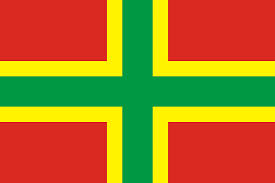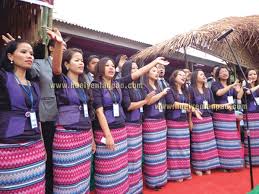Who Are the Zomi?
  
The Zo,
also known as the Mizo, the Kuki, the Chin,
the Zomi and a number of other names, are a large group of
related Tibeto-Burman tribal peoples spread throughout the
northeastern states of India, northwestern Burma, and the Chittagong Hill
Tracts of Bangladesh. In northeastern India, they are present in: Nagaland, Mizoram, Manipur and Assam. This dispersal
across international borders resulted from British colonial policy that drew
the borders on political grounds rather than ethnic ones.
The
Zo have typical Tibeto-Burman features and are generally of short-stature with
straight black hair and dark brown eyes. Natively, the Zo speak one of the
fifty or so languages that linguists call the Kukish language
group, which is also known as Kuki-Chin (Kuki/Chin), Mizo/Kuki/Chin,
or Kuki Naga.
The
Zomi or Zo people (‘mi’ means people) have long inhabited the mountainous areas
between India and Burma for centuries. In Burma, the Zo people occupy the whole
of Chin State and Kalay, Tamu and Khampat townships in Sagaing division.
However,
due to the lack of contact with the outside world, the group was often referred
to as the “Chin” instead of their own name “Zomi.”
The British first imposed the name “Chin” on the group when the
colonists first made contact with the Zo people in the 19th century. According
to Dr. Vum Son, the author of Zo
History, the British adopted the name from the Burmans.
When
the Burmans first came in contact with the group in the eleventh or twelfth
century, they began calling the Zo people “Chin” for the simple reason that the
basket carrying people occupied the western part of the Chindwin River –
“Chindwin” meaning “the valley of the baskets”. The word “chin” means basket in
Burmese.
The
Zo people have their own traditions, culture and language that are
completely different from the ethnic Burmans. After Burma gained independence
from the British, many Zo people refused to accept the name Chin – a term that
they have never used themselves and was only officially used only after British
annexation.
Dr.
Hau Go, a Zomi scholar and lecturer at Mandalay University, wrote: “Whatever
Chin meant or means, however it originated and why, the obvious fact is that
the designation ‘Chin’ is altogether foreign to us, it has been externally
imposed [on] us. We respond to it out of necessity but we never appropriate it
and never accept it and never use it to refer to ourselves. It is not only
foreign but also derogatory, for it has become more or less synonymous with
being uncivilised, uncultured, backward, even foolish and silly.”
|